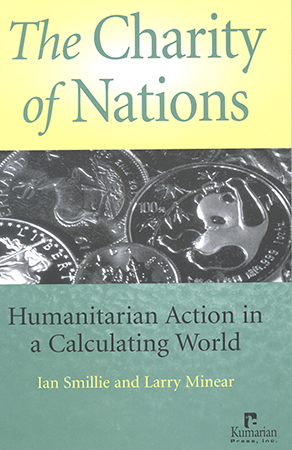
- 2004/276 pages
- A Kumarian Press Book
The Charity of Nations:
Humanitarian Action in a Calculating World
Hardcover: $58.00
ISBN: 978-1-56549-191-5
Paperback: $27.50
ISBN: 978-1-56549-190-8
Ian Smillie and Larry Minear probe the reasons behind governmental and nongovernmental responses to urgent human need. They explain why some crises got the lion's share of attention and resources, while others are essentially forgotten.
Vibrantly contrasting cases of Afghanistan, East Timor, and Sierra Leone, among others, illustrate how foreign policy and domestic politics have shaped what has become the business of humanitarianism. The authors call for a revamped humanitarian structure—one that eliminates the ambiguities and confusion that exist today. They argue for a shift away from a rampant political and commercial intrusion, and a rededication to multilateralism, genuine accountability, and trust.
Vibrantly contrasting cases of Afghanistan, East Timor, and Sierra Leone, among others, illustrate how foreign policy and domestic politics have shaped what has become the business of humanitarianism. The authors call for a revamped humanitarian structure—one that eliminates the ambiguities and confusion that exist today. They argue for a shift away from a rampant political and commercial intrusion, and a rededication to multilateralism, genuine accountability, and trust.







